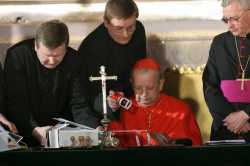
Europe Features
Looking for a miracle: The
beatification of John Paul II
By Mary Sibierski
Apr 2, 2006, 19:00 GMT

| Yesterday's picture shows members of the Polish beatification tribunal - Cardinal Stanislaw Dziwisz (C, in red), Bishop Tadeusz Pieronek (R) and Father Piotr Majer (2nd from L) - signing documents prior to a mass held by Cardinal Stanislaw Dziwisz, a close friend and former secretary to Pope John Paul II, at Krakow's Wawel Cathedral late Saturday, 01 April 2006. The mass officially marked the end of work of the special tribunal set up in Poland to hear testimony to decide whether the late pope, who died on 02 April 2005, should be beatified. EPA/JACEK BEDNARCZYK |
Rome/Warsaw - The global spectacle of his Vatican funeral last April was proof enough for many that Pope John Paul II was a miracle worker.
Broadcast live to an audience of more than one billion across the planet, the historic event attracted an unprecedented troop of world leaders - some of them sworn enemies. But there, they stood shoulder to shoulder, united in prayer and homage.
A tinge of the supernatural hung in the air, as an unusually strong wind billowed across St. Peter's Square marble expanse. It ballooned banners calling "Santo Subito!" ("saint immediately") touted by faithful pilgrims, and eerily blew shut the Bible atop the dead pontiff's simple wooden coffin.
"The Holy Father was very active in life and he's still very active now too," says Monsignor Slawomir Oder. The young bespectacled Polish priest is heading the Vatican's probe into a tidal wave of apparent miracles attributed to John Paul, both in life and after death.
"You can can still count on him," agrees Cardinal Stanislaw Dziwisz, who as John Paul's closest personal aide during his ground- breaking 27-year pontificate, knew him best.
The Vatican's Congregation for the Causes of Saints must investigate, document and certify one miracle performed after death in order for a candidate to be beatified, and then a second miracle to qualify for canonization as a saint.
Last May, German-born Pope Benedict XVI dispensed with the customary five-year waiting period required after death to begin the beatification process, putting his illustrious predecessor on the fast-track to sainthood.
Monsignor Oder admits to having been deluged with letters and emails from around the globe attesting to a tidal wave of miracle cures attributed to John Paul after death, but he remains tight- lipped about revealing details of the testimonies.
After six months of hearing witness testimony in John Paul's native Poland, Oder and his team of spiritual sleuths turned their attention in March to the case of a French nun who is believed to have been cured of Parkinson's disease by the intercession of the late pontiff only two months after his April 2, 2005 passing.
The nun, whom Oder described as "a relatively young person, not the youngest, but young" in a recent interview with the Polish PAP news agency, was apparently cured of Parkinson's after her fellow sisters prayed to the late pontiff for her recovery.
Living in an undisclosed diocese in France, she was able to return to her hospital work with newborn infants. The case must be investigated and approved by three separate Vatican committees, including ones focused on medical and theological issues and a third led by cardinals.
The process of certifying a medical miracle cure could take some time, according to Polish priest Hieronim Fokcinski from the Vatican's Congregation for the Causes of Saints. Medical investigators are keen to make sure the cure is genuine and that the illness with not recur.
"In certain illnesses, physicians will give their opinion only after a longer period of time following the recovery, because the sickness can return after a few years," Fokcinski told the PAP. "So either we wait or we look for another case which is easier to prove."
Lech Walesa, Poland's legendary leader of the 1980's anti-communist Solidarity trade union, believes there is not a shadow of doubt the pontiff worked a global historical, social and political miracle.
"He came as a miracle from heaven giving us the courage to act," says Walesa, of Karol Wojtyla's first 1979 pilgrimage as pontiff to his native Poland. At the time the country was in the iron grip of an atheist communist regime loyal to the Soviet Union.
"Before the Holy Father was elected we had all of 10 people
fighting for free trade unions-- afterward we had 10 million!" Walesa
recalls of the inspiration the pontiff gave to his fellow countrymen to
stand up to their totalitarian rulers.
Following the 1978 advent of the "Polish papacy," Solidarity blossomed from a handful of militant shipyard workers in the Baltic port city of Gdansk into a 10 million-strong non-violent offensive against the communist regime.
The peaceful resistance came to fruition in 1989 with the first semi-democratic elections in the communist bloc and the subsequent bloodless demise of communism in Poland. The entire Soviet bloc collapsed by 1991, heralding the end of the bipolar world of the Cold War and the beginning of a new era in the global political order.
"I believe he was God's special gift to us all," reads a message from a US Catholic identified only as Brian posted on an official Vatican website devoted to John Paul's beatification. "I look forward to the day he is officially made a saint. In my eyes he already is."
For futher information click:http://www.vicariatusurbis.org/Beatificazione/
© 2006 dpa - Deutsche Presse-Agentur